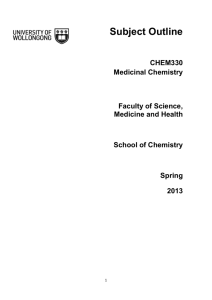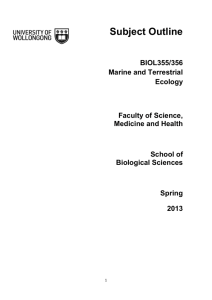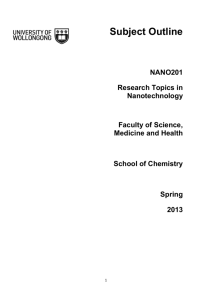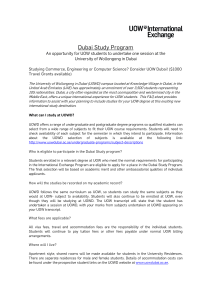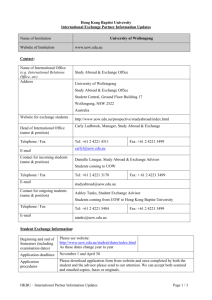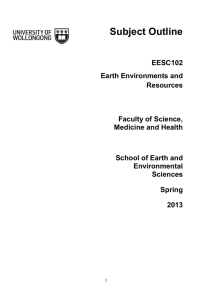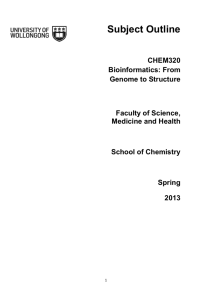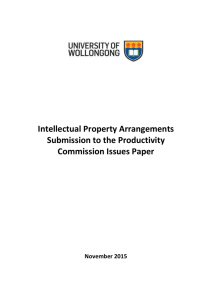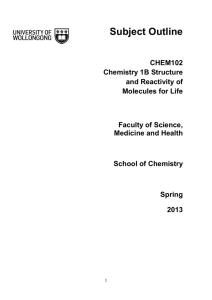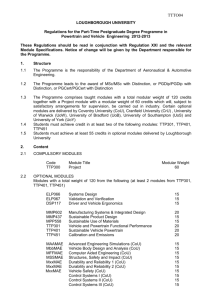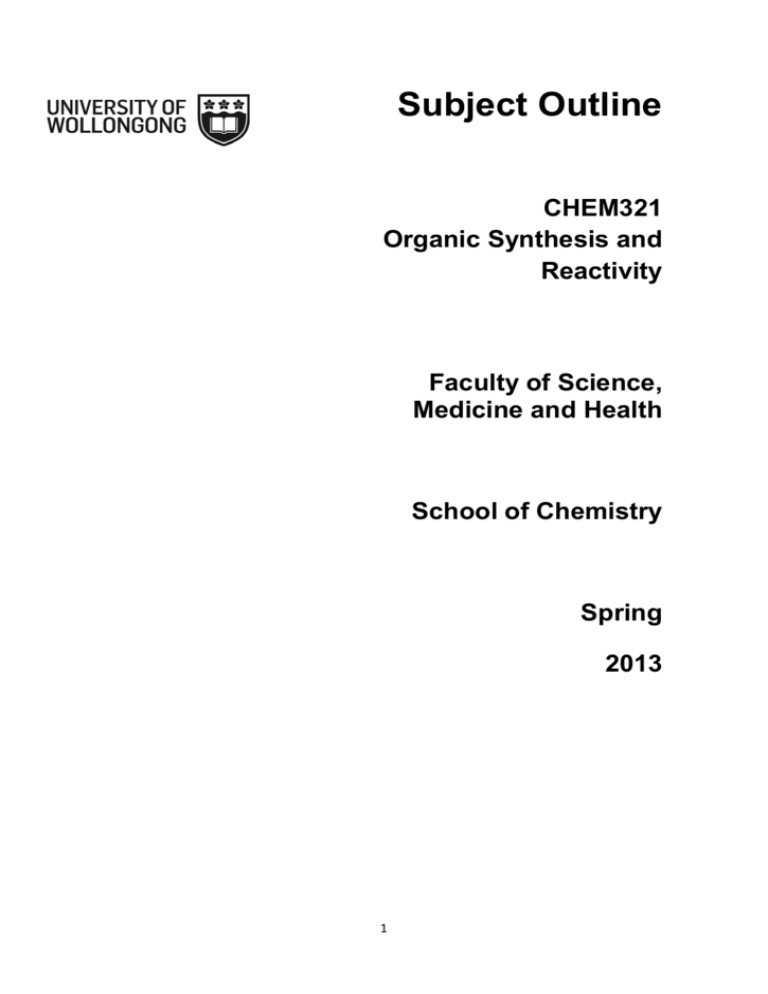
Subject Outline
CHEM321
Organic Synthesis and
Reactivity
Faculty of Science,
Medicine and Health
School of Chemistry
Spring
2013
1
Subject Outline
Subject code:
CHEM321
Subject name:
Organic Synthesis and Reactivity
Credit points:
8
Pre/co-requisites:
CHEM212
Mode of delivery:
On Campus
Delivery location:
Wollongong
Version history
3rd edition
Prof. Stephen Pyne, Faculty of Science Medicine and Health
st
1 edition
Dr. Michael Kelso , Faculty of Science , UOW
© University of Wollongong 2010. All rights reserved.
2013
2010
Copyright and Disclaimer
No part of this work may be reproduced without the prior written consent of the University of Wollongong. All requests and
enquiries should be directed to the Vice-Principal (Administration), University of Wollongong, Northfields Avenue, Wollongong
NSW 2522 Australia. Within Australia telephone (02) 4221 3920; international +61 2 4221 3920.
http://www.uow.edu.au/about/disclaimer/index.html
The University of Wollongong attempts to ensure that the information contained here is correct at the time of production,
however, sections may be amended without notice by the University in response to changing circumstances or for any other
reason.
2
Contacts
Subject Co-ordinator
Name: Prof. Stephen Pyne
Faculty of Science, Medicine and Health
Location
41.152
Telephone
Email
61 2 4221 3492
smah_student_enquiries@uow.edu.au
Consultation mode and times:
_________________________________________________________________________
Lecturers
Prof. Stephen Pyne
Office
18.121
Dr Danielle Skropeta
18.127
Dr Michael Kelso
18.115
Dr. Wilford Lie
18.G03
A. Prof. Paul Keller
18.222
Phone
Email
Consultation
times*
42213511
spyne@uow.edu.au
M-F 1.304.30 pm
42214360
skropeta@uow.edu.au
42215084
mkelso@uow.edu.au
42213473
wilford@uow.edu.au
42214692
keller@uow.edu.au
Students should contact staff by email to make an appointment
3
Subject Information
Outline
Outline as per Handbook entry
Learning Outcomes
Through successful completion of this subject students will be able to:
(i)
Identify organic compounds using a combination of chemical and spectroscopic
techniques;
(ii)
Determine the stereochemistry of organic compounds from NMR spectra and
explain the stereochemical outcomes of diastereoselective and enantioselective
reactions;
(iii)
Use molecular modelling software to solve simple chemical problems;
(iv)
Understand fundamental organic reaction mechanisms (including free radical and
carbene reactions, metal catalysed reactions and reactions of carbanions);
(v)
Understand the basic principles of heteroatom effects on the properties of
heterocyclic systems; and
(vi)
Synthesise simple organic molecules in the laboratory and be familiar with
modern organic chemical synthetic methods.
Faculty Graduate Qualities
Valuable qualities gained by UOW graduates are essential for gaining employment and
making an important contribution to society and their chosen field – further information is
available at http://www.uow.edu.au/about/teaching/qualities/
Engagement in this subject will contribute to each student’s development of the following
UOW Graduate Qualities:
Informed
• Comprehensive knowledge of an area of Science and well-developed skills in using
relevant technologies
• Awareness of the international context in which advances in Science are made and
applied
Independent learners
• Critical thinking skills
• Scientific approach to the acquisition, analysis, and interpretation of data
Independence in seeking to extend knowledge through ongoing research, enquiry and
reflection
• Problem solvers
• Application of creative, logical and critical thinking to scientific problems
Effective communicators
• Well-developed written, oral & aural communication
4
•
Effective collaboration and teamwork across a range of settings and cultures
Responsible
• Ethical decision making
• Respect for diverse opinions, professions, and cultures
Lecture/Tutorial/Laboratory Times
Refer to http://www.uow.edu.au/student/timetables/index.html for an up-to-date timetable.
See Lecture Schedule
Study Time
Students should note that UOW policy equates 1 credit point with 2 hours of study per week
that includes lectures and tutorials. For example, in a 6 credit point subject, a total of 12
hours of study per week is expected.
Prescribed Reading
1. Clayden, Greeves, Warren & Wothers, Organic Chemistry, Oxford University Press,
2001 or 2nd edition
2. Pavia, Lampman & Kriz, Introduction to Spectroscopy, 3rd Ed, Brooks/Cole Publishing
2001 or later edition.
Recommended Readings
Will be announced in lectures:
Materials
You must purchase a set of laboratory notes from the Unicentre bookshop in preparation for
your 1st lab class in Week 1. A laboratory coat and safety glasses are also required, as well
as at least 2 blank notebooks.
e-Learning
This subject has materials and activities available via eLearning. To access eLearning you
must have a UOW user account name and password, and be enrolled in the subject.
eLearning is accessed via SOLS (student online services). Log on to SOLS and then click on
the eLearning link in the menu column.
For information regarding the eLearning spaces please use the following links:
Blackboard Vista - http://www.uow.edu.au/student/elearning/vista/index.html.
Moodle - http://uowblogs.com/moodlelab/files/2013/05/Moodle_StudentGuide-1petpo7.pdf
5
Lecture and Lab Schedule
CHEM321 Syllabus
Reactive Intermediates
Stereochemistry
NMR Spectroscopy
Heterocyclic Chemistry
Pericyclic Reactions
Organic Synthesis
Week
Lectures
7 hrs
4 hrs
5 hrs
8 hrs
6 hrs
8 hrs
Stephen Pyne
Danielle Skropeta
Wilford Lie
Michael Kelso
Danielle Skropeta
Paul Keller
Wed
Thurs
Thurs
11:30-12:30
4:30-5:30
5:30-6:30
[25.128]
[40.131]
[40.131]
DS
WL
1
DS
2
DS
DS
WL
3
WL
WL
WL
DS
PK
4
DS
5
DS
DS
PK
6
DS
DS
PK
7
QUIZ
PK
PK
8
PK
PK
PK
9
SP
SP
SP
RECESS (1 week)
10
SP
SP
SP
11
SP
MK
MK
12
MK
MK
MK
13
MK
MK
MK
LABS START IN WEEK 1!!
LAB CLASSES:
GROUP 1: Wednesday 2.30-5.30pm 41.343; GROUP 2: Thursday 9.30-12.30pm 41.343.
6
Assessment
Minimum attendance requirements
Labs comprise one 3 hour session per week and start in week 1. There will be no changing
between practical timeslots. Exceptions to this will only be considered if students miss a lab
period and produce a medical certificate. Students must sign the attendance book each
week and complete not less than 85 % (but normally all) of the laboratory experiments. In
event of illness a medical certificate must be supplied to administration, however, the 85%
minimum still applies.
Minimum performance requirements
CHEM321 is an eight credit point subject and consists of three hours of lectures/tutorials and
a three hour practical class each week.
Marks in the subject are distributed as follows:
Final examination
55% of total assessment
Quiz
10% of total assessment
Spectral identification projects (2)
10% of total assessment
Practical work
20% of total assessment
Molecular modelling assignment
5% of total assessment
In order to be awarded a pass grade or higher the following criteria must be satisfied:
i)
total mark (weighted as shown above) > 50%; AND
ii)
final exam mark > 45%; AND
iii)
85% of practicals satisfactorily completed
Students who do not meet the minimum performance requirements as set out in the Subject
Outline may be given a Fail grade or TF (Technical Fail) grade on their Academic Transcript.
See
the
General
Course
Rules
at http://www.uow.edu.au/handbook/generalcourserules/index.html
Performance grades
HD
D
C
P
PS
F
TF
High Distinction
Distinction
Credit
Pass
Pass Supplementary
Fail (unsatisfactory completion)
Technical Fail
7
85–100%
75–84%
65–74%
50–64%
50%
0–49%
No mark recorded
Scaling
Marks awarded for any assessment task (including examinations) may be subject to scaling
at the end of the session by the Unit Assessment Committee and/or the Faculty Assessment
Committee (FAC). Marks will only be scaled to ensure fairness/parity of marking across
groups of students. Scaling will not affect any individual student’s rank order within their
cohort.
For
more
information
refer
to
Assessment
Guidelines
–
Scaling http://www.uow.edu.au/about/policy/UOW058609.html
Submission and Return of Assessment Items
Submitting an assignment at SMAH Central
Assignments must be submitted at SMAH Central and MUST have a SATS (Student
Assignment Tracking System) coversheet attached to the front of the assignment.
Instructions for generating a coversheet can be found on the SMAH Central web page.
For an assignment to be successfully submitted at SMAH Central please note the following:
•
•
•
•
The coversheet must be signed and dated
The assignment must have the correct coversheet i.e. the correct subject code and
tutorial group (if applicable)
A legible barcode with all numbers and digits below e.g. UOW20121007656
Assignments must be submitted by 2.30pm on the due date
If an assignment is submitted to SMAH Central without any of the above we will contact you
and advise that you need to return to SMAH Central with the correct coversheet. Your
assignment won’t be recorded as being submitted until the correct coversheet is attached.
This might mean that the assignment is recorded as being submitted late.
Late Submission
All assessment tasks are to be submitted on the due dates as specified in this Subject
Outline. Assessment tasks submitted late will be penalised by the deduction of 10% of the
maximum possible mark for the assessment task per calendar day or part thereof. Deduction
of marks will not result in a negative mark.
Note that assessment tasks submitted to SMAH Central must be submitted by 2:30 pm on
the due date to guarantee being recorded in SATS as being submitted on time.
Academic Consideration including Extensions of Time
Applications from students for academic consideration should be made only on the grounds
of serious or extenuating circumstances. Applications for academic consideration are
governed
by
the
University’s
Student
Academic
Consideration
Policy
at http://www.uow.edu.au/about/policy/UOW058721.html
Do not assume that an application for special consideration will be automatically granted.
8
Supplementary Assessments
Supplementary assessment may be offered to students who receive a mark of 48% or 49%,
and are otherwise identified as meriting an offer of a supplementary assessment. The form
of supplementary assessment will be determined at the time the offer of a supplementary
assessment is made. For more information refer to the Supplementary Assessment
Guidelines http://www.uow.edu.au/content/groups/public/@web/@gov/documents/doc/uow1
12335.pdf.
Note that if you are offered a supplementary examination as the supplementary assessment
that you will need to sit the examination in the supplementary examination period.
Referencing
The American Chemical Society referencing system is preferred
Please
consult
the
UOW
library
website
information: http://public01.library.uow.edu.au/refcite/style-guides/html/
for
further
Plagiarism
Students are responsible for submitting original work for assessment, without plagiarising or
cheating, abiding by the University’s policy on plagiarism as set out in the University
Handbook under the University’s Policy Directory. Plagiarism has led to expulsion from the
University.
The University’s Academic Integrity and Plagiarism Policy, Faculty Handbooks and subject
guides clearly set out the University’s expectation that students submit only their own original
work for assessment and avoid plagiarising the work of others or cheating. Re-using any of
your own work (either in part or in full) which you have submitted previously for assessment
is not permitted without appropriate acknowledgement. Plagiarism can be detected and has
led to students being expelled from the University.
The use by students of any website that provides access to essays or other assessment
items (sometimes promoted as ‘resources’) is extremely unwise. Students who provide an
assessment item (or provide access to an assessment item) to others, either directly or
indirectly (for example by uploading an assessment item to a website) are considered by the
university to be intentionally or recklessly helping other students to cheat. This is considered
academic misconduct and students place themselves at risk of being expelled from the
University.
http://www.uow.edu.au/about/policy/UOW058648.html
9
Assessment Tasks
_________________________________________________________________________
DUE DATES FOR SUBMISSION OF LABORATORY REPORTS AND
ASSIGNMENTS (Assignments must be submitted at SMAH before 2.30pm on
the due date) Assignments due on Wednesday or Thursday the same day as
you lab class.
EXPERIMENT/ASSIGNMENT
MARKED OUT OF
WEEK DUE
Experiment 1 (Identification of an Unknown)
20
4
Experiment 2 (Reactive Intermediates: Carbenes)
10
5
Spectroscopy Assignment 1
10
7
Experiment 3 (Stereochemistry: Benzoin Reduction)
10
8
Spectroscopy Assignment 2
10
10
Experiment 4 (Organic Synthesis: Chalcones)
20
11
Experiment 5 (Wittig /Diels Alder Chemistry)
20
13
Molecular Modeling Assignment (Done in Week 11,
20
13
Wednesday lab class 2.30-5.30pm; Thursday lab
class, 9.30-12.30pm 17.105.)
LATE SUBMISSION
Marks will be deducted for late reports/assignments. Only in special circumstances with
the production of a relevant medical certificate may an extension be granted. Extensions
will only be granted if academic consideration is sought via the appropriate pathway through
SMP. Marks will be deducted for late reports as follows:
•
1 mark deducted per day late (including weekends) up to 1 week late.
If more than 1 week late a mark of zero will be given.
Criteria for assessment:
please refere to the laboratory manual and the SMP web page
10
General Advice
Students should refer to the Faculty of Science, Medicine and Health website for information
on policies, learning and support services and other general advice.
Use of Electronic Devices in Timetabled Activites
Ensure that mobile phones are turned off or turned to silent before timetabled activities.
Electronic devices including mobile phones and portable MP3 players should not be
accessed during timetabled activities unless otherwise advised.
11



